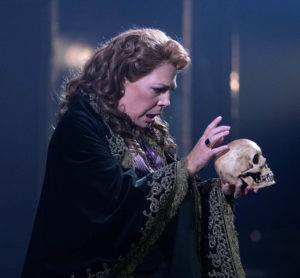
Teatro Real de Madrid 2020-21 Review: Un Ballo in Maschera, Cast B
Sondra Radvanovsky Delivers A Truly Sublime Experience in Madrid
By Mauricio Villa(Credit Javier del Real)
This review is for the performance of the 3d of October 2020.
Due to the cancellation of a previous soprano, the Teatro Real engaged three additional sopranos for this middle-period Verdi opera: Saioa Hernandez, Maria Pia Piscitelli, and Sondra Radvanovsky. And while all three are fantastic artists in their own right, there was no doubt that the one most anticipated for this run of performances was the last of the trio.
Radvanosky is one of the best sopranos of the last generation.
There are good singers, and then, there are those unique artists that despite having a wonderful voice and technique have such a strong personality and natural acting abilities that they hypnotize the audience. Radvanovsky belongs to this last kind.
She possesses a penetrating, dark timbre, immense and ringing high notes, and soaring pianissimi. Her performance showcased all these virtues.
A True Star Turn
In her first and short solo appearance in the second scene of Act one, Radvanovsky provided a masterclass in long legato phrases by singing the line “Consenti mio signore, virtú…” in one breath, capping it with an amazing mezza voce with a sparkling pianissimo A natural. She coronated the scene with two strong high B naturals that expressed Amelia’s sense of desperation after she met with Ulrica.
The second act opens with her aria “Ecco l’orrido campo.” Here Radvanovsky gave it all: consistency and dramatism in her lower register, big long legato phrases, potent, dramatic outbursts on “e m’affisa, e màffisa,” a strong overwhelming high C and crystalline pianissimi on the B flat of the last cadenza. Unsurprisingly, the audience went wild.
Her interpretation of the duet “Teco io sto” was passionate, her voice easily riding over the forte outbursts in the orchestra; this was most present at the very end where she spun a sublime high C. She showed similar vocal prowess in the ensuing trio.
During her third act “Morro ma prima grazia,” Radvanovsky sang with desperation, melancholia, and forgiveness, coloring every phrase with emotion and dynamics and offering another ethereal pianissimo on the high C flat of the cadenza.
Her tenderness and emotion were outstanding during her last short duet with the tenor, effortlessly emitting the several B flats on “Cadavere domani sarai se tu rimani” while making a crescendo. She ended the evening by delivering a blooming, dolcissimo B flat during the final scene, carrying well over the rest of the ensemble.
What made her interpretation remarkable was the characterization of the role. Radvanovsky has sung “Amelia” more than 200 times, and it shows. You never see the singer behind the character, there is not a single gesture of movement which is not justified by the drama. Radvanovsky was scared, in love, in remorse, frightened, in doubt…She did not hesitate about screaming, moaning, trembling, and crying. She literally bared her soul on stage in such a way that you could not look away. It was a truly masterful performance in every possible way.
Veteran Presence
Veteran Mexican tenor Ramón Vargas sang the role of Riccardo, a part he has interpreted more than 100 times. The highlight of his performance was his aria “Forse la soglie…” where the tenor showed a big display of legato long phrases, mezza voce, and sustained high notes. With the soft orchestration of this passage, his voice had no trouble filling the auditorium. But during the whole performance, especially in the pasaggio and high notes, his voice struggled a bit to cut through the orchestral density, other singers, and chorus members. His high notes lacked brilliant squillo and when he covered his sound in the passaggio, the voice lost some of its projection. When singing with Radvanosky, the soprano usually overpowered him, especially during the second act duet “Teco io sto”.
That said, he played Riccardo with dignity and emotion, dominating the stage and showing his strong physical presence.
Renato was performed by the bariton George Petean who delivered an excellent performance with his fair vibrato, clear sound, and resonant high notes. His best moments came in the first scene of Act three. He was terrifying and violent both vocally and physically with Amelia, delivering a strong extra high G in “Sangue vuolsi” while throwing Riccardo’s portrait violently to the floor. He sang his aria “Alzati…Eri tu” coloring all the different emotions anger, fury, disappointment, and sorrow gloriously with his voice. While showing emitting exquisite legato lines, he delivered strong F, F sharps and a G. His high notes are his best trademark, because when he covers the sound around E flat, E and F, the sound muffles up, losing consistency and projection. He was splendid during the trio with the conspirators and the following ensemble.
Sara Blanch debuted as Oscar at the Teatro Real. She has a dark voice, which is quite unusual for such a light role. But she managed quite aptly to take on all the major challenges presented to her: fast coloratura, staccato high notes and diminuendo on a high C, performing cheerfully and with energy.
And while the cast overall was solid, the night belonged to Radvanovsky who ended the night earning one of the most enthusiastic ovations I’ve ever heard at the Teatro Real.


